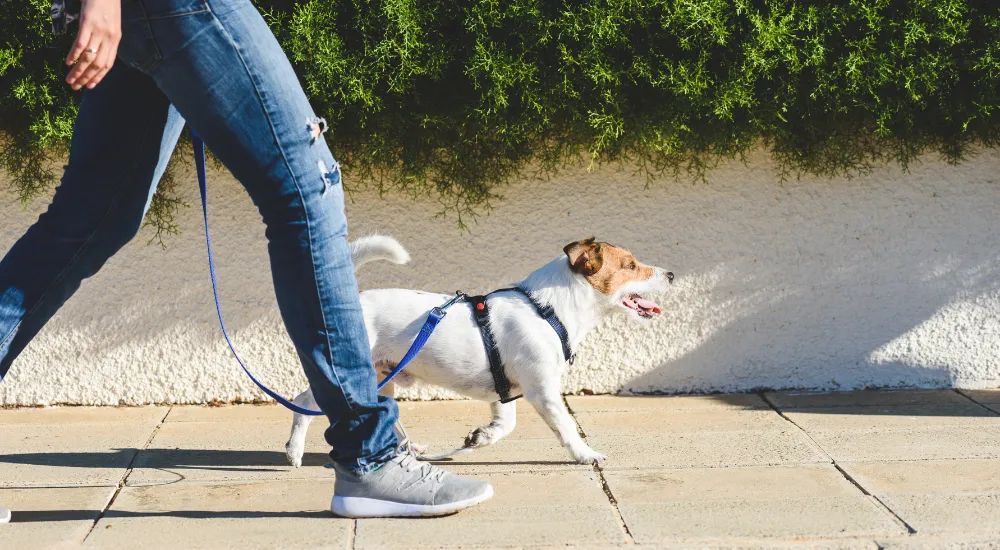Home / Trending / Health / Fun
How Often Should You Walk Your Dog?
''It's a very common question. The answer, of course, depends on a variety of factors!''

Dog Lovers Association, Sept 19 2022 · 4 minute read

Dogs are a huge part of many people's lives. They provide companionship, love, and loyalty. It's important to make sure that you are providing your dog with everything they need, including plenty of exercise.
So, how often should you walk your dog? Many experts agree that dogs should get at least 30 minutes of exercise each day. If you can't commit to walking your dog for 30 minutes every day, try splitting up the walks into two 15-minute walks throughout the day.
Your dog will appreciate it!
Unfortunately, there is no one-size-fits-all answer to this question. The frequency of walks will depend on things like your dog's age, breed, energy level and health.
In this blog post, we'll break down some of the factors that you should consider when deciding how often to walk your dog.
By the way...
...if you're a Dog Lover who'd like to know How to Make a Dog's Life Better, then Sign-up for Our Free Newsletter and you’ll Start Receiving Tips and Valuable Information for Dog Lovers…
...Sign-up Below
a).- Age
A puppy's bones are still developing, so they need more frequent walks than an adult dog. A good rule of thumb is to walk puppies 5-6 times per day for a total of 30 minutes to 1 hour. Once they reach adulthood (around 1 year old), you can cut back to 2-3 walks per day.
b).- Breed
Certain breeds were bred for specific tasks, like herding or hunting. As a result, they have higher energy levels and require more exercise than other breeds. If you have a high energy breed like a Border Collie or Australian Cattle Dog, you should aim for 3-4 walks per day. For comparison, low energy breeds like Shih Tzus only need 1-2 walks per day.
c).- Energy Level
In addition to breed, your dog's individual energy level will also affect how often they need to be walked. A good way to gauge your dog's energy level is by observing their behavior. If they're always running around and full of energy, they'll probably need more exercise than a dog who likes to lounge around all day. Dogs with high energy levels will need 3-4 walks per day, while low energy dogs only need 1-2 walks per day.
d).- Health
Dogs with certain health conditions may need more or less exercise than healthy dogs. For example, dogs with arthritis may need shorter but more frequent walks instead of longer ones. Speak with your veterinarian about what kind of exercise routine is best for your dog's health needs.
Here Are a Few Tips for When You're Walking Your Dog.
1.- Do It Every Day
Ideally, you should walk your dog every day. This will help to keep them healthy and fit, and will also allow them to get the mental and physical stimulation that they need. If you cannot walk your dog every day, aim for at least 3-4 times per week.
2.- At Least 20-30 Minutes a Day
Each walk should last for 20-30 minutes. This is enough time for your dog to get some exercise, but not so long that they will become bored or tired. If you have a large dog, you may need to walk them for longer periods of time in order to tire them out.
3.- Vary the Routes
To keep your dog from getting bored, be sure to vary the routes that you take them on. You can do this by walking in different neighborhoods, parks, or even woods. If you always take the same route, your dog will quickly become familiar with it and may become less interested in walking.
4.- Go at Their Pace
It is important to remember that dogs have their own pace, and you should try to go at their pace rather than yours. This means that if your dog wants to stop and smell something, you should let them. If they want to walk faster or slower than you do, adjust your speed accordingly.

Conclusion
The bottom line is that there is no single answer to the question "how often should you walk your dog?" The frequency of walks will depend on different factors.
By taking all of these factors into account, you can figure out a walking schedule that works best for both you and your furry friend!
If you can't commit to walking your dog for 30 minutes every day, try splitting up the walks into two 15-minute walks throughout the day.
Your dog will appreciate it!
Felipe Martínez · Dog Lovers Association
FAQ's.- Questions and Answers About Dog Walking
Q:How often should I walk my dog?
Ideally, you should walk your dog every day. This will help to keep them healthy and fit, and will also allow them to get the mental and physical stimulation that they need. If you cannot walk your dog every day, aim for at least 3-4 times per week.
Q: What if my dog has health problems? Can I still walk them?
Dogs with certain health conditions may need more or less exercise than healthy dogs. For example, dogs with arthritis may need shorter but more frequent walks instead of longer ones. Speak with your veterinarian about what kind of exercise routine is best for your dog's health needs.
Q: What are some good ways to keep my dog from getting bored on walks?
To keep your dog from getting bored, be sure to vary the routes that you take them on. You can do this by walking in different neighborhoods, parks, or even woods. If you always take the same route, your dog will quickly become familiar with it and may become less interested in walking.
Q: How long should each walk be?
Each walk should last for 20-30 minutes. This is enough time for your dog to get some exercise, but not so long that they will become bored or tired. If you have a large dog, you may need to walk them for longer periods to tire them out.
© Dog Lovers Association 2025 - All Rights Reserved
1300 Cornwall Road, Suite 201-204 Oakville ON L6J 7W5, Canada
Disclaimer: Not intended to be a substitute for professional veterinarian advice, diagnosis, or treatment. Always seek the advice of your veterinarian with any questions you may have regarding the medical condition of your pet. If you think your pet has a medical emergency, call or visit your veterinarian or your local veterinary emergency hospital immediately.We do not provide medical or legal advice. We are just a group of people who love dogs and try our best to get you the most accurate and useful information about the topics related to Responsible Dog Ownership. We are not veterinarians and we do not have any type of professional qualifications regarding dogs. We do our best to collect volunteers and financial aid to help dogs and dog shelters in need.

